- California Assembly OKs highest minimum wage in nation
- S. Korea unveils first graphic cigarette warnings
- US joins with South Korea, Japan in bid to deter North Korea
- LPGA golfer Chun In-gee finally back in action
- S. Korea won’t be top seed in final World Cup qualification round
- US men’s soccer misses 2nd straight Olympics
- US back on track in qualifying with 4-0 win over Guatemala
- High-intensity workout injuries spawn cottage industry
- CDC expands range of Zika mosquitoes into parts of Northeast
- Who knew? ‘The Walking Dead’ is helping families connect
Tourism is new cash cow for North Korea
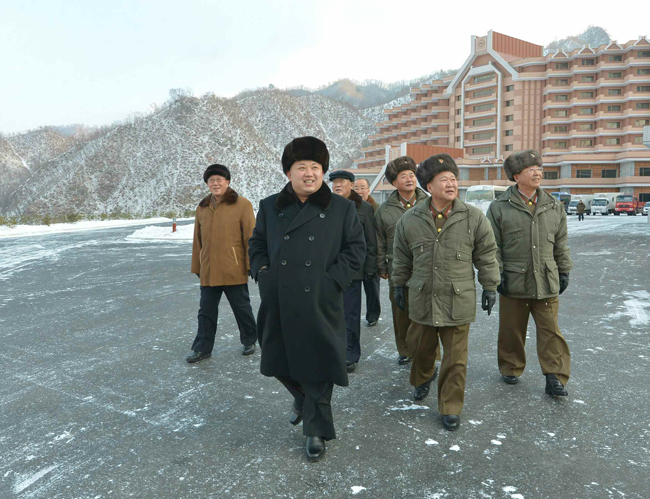
North Korean leader Kim Jong-un looks around the Masik Pass Ski Resort with his aides in this photo taken in December 2013. North Korea has been stepping up efforts to draw international tourists since Kim took power in December 2011. (Korea Times file)
By Yi Whan-woo
Tourism is emerging as a new cash cow for North Korea amid growing U.N. pressure on its economy amid its state-perpetrated human rights violations, according to analysts last week.
They speculated that the cash-strapped Kim Jong-un regime could step up efforts to boost tourism in the long term.
The experts said travelling to North Korea is not currently seen as a violation of U.N. Security Council (UNSC) resolutions that restrict trading activities between the internationally-isolated regime and the rest of the world because of Pyongyang’s development of weapons of mass destruction.
They also said touring the authoritarian state is not considered defiance against growing U.N. calls to improve Pyongyang’s dire human rights records, including the severe working conditions of North Korean laborers overseas.
“North Korea could capitalize on tourism as a growth engine to escape poverty,” said Yoon In-joo, a researcher at the Korea Maritime Institute.
Citing her 31-page research paper released this year, Yoon said North Korea’s income from foreign tourists was estimated to be in the range of $30.6 million to $43.6 million last year.
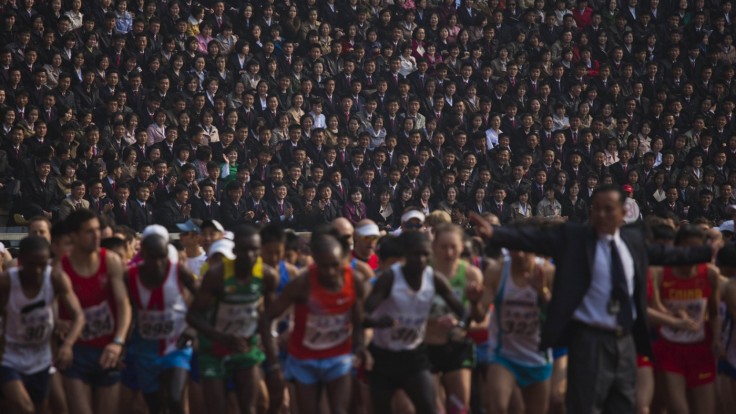
North Korean spectators watch from the stands of Kim Il-sung Stadium as runners line up at the start of the Mangyongdae Prize International Marathon in Pyongyang, North Korea. (AP Photo/David Guttenfelder)
She pointed out that such income comes from money paid by some 95,000 tourists from China and 5,000 from Western countries on various attractions in North Korea, including beaches, mountains and ski resorts.
Yoon added earnings from tourism are “noteworthy” considering North Korea’s annual income from the Gaeseong Industrial Complex (GIC) was $86 million in 2014.
The GIC is an inter-Korean industrial park in the North Korean border town of Gaeseong.
A total of 124 small- and medium-sized enterprises from South Korea have employed over 50,000 North Korean workers at the GIC. It has been seen as another major cash cow for the impoverished regime since it opened in December 2004.
North Korea has launched a drive to draw international tourists since Kim Jong-un took power in December 2011 by introducing a variety of tour packages that give participants sports, military and work experiences.
A researcher at the Korea Institute for International Economic Policy (KIEP) said the tour sites in the reclusive state has “special merits” to attract Chinese and citizens of former Communist states.
“Our studies show a considerable number of elderly Chinese and those from former Stalinist states often want to recollect memories of the early Cold War era,” the researcher said on condition of anonymity.
“Those people want to visit the place where everything around them looks communist, such as square with a red flag of the yellow hammer and sickle hanging on a tall flag pole, as well as people wearing Mao suits and Soviet-style military uniforms.
“North Korea is where such communist things are perfectly preserved,” he added.
He cited that several foreign travel agencies recently have introduced tour programs to the secretive state in relation to the annual Pyongyang Marathon in April.
North Korea first allowed foreigners to join the competition last year.
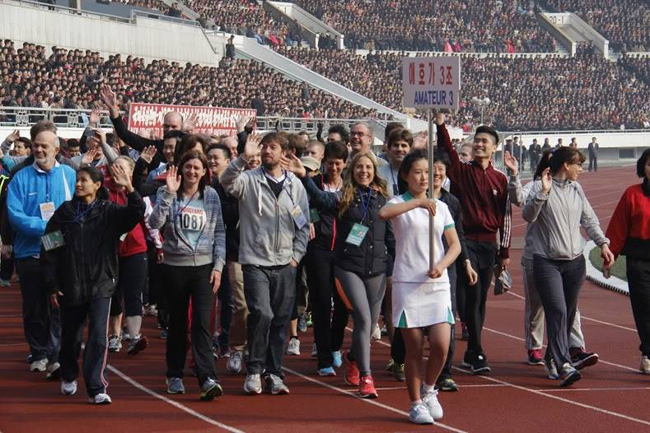
Foreign runners join a ceremony to mark the annual Pyongyang Marathon in this photo taken in August 2014. North Korea plans to invite up to 1,500 marathoners from abroad in April next year.
(Courtesy of Koryo Tours)
And it plans to invite up to 1,500 foreign marathoners in next year’s event, according to Young Pioneer Tours, a China-based company.
It said it has “high expectations” for its five-day tour package to North Korea, which will cost $1,060.
It said its customers will have a chance to “get a glimpse” of North Korea on the occasion of the 104th anniversary of the birth of country’s founder Kim Il-sung on April 15.
The agency added that participants will be able to visit “must see sites” in the North Korean capital and also the Demilitarized Zone, which has dissected the Korean Peninsula since the end of the 1950-53 Korean War.
Koryo Tours, also a China-based company, said it plans to offer five different types of tour programs to North Korea to mark the Pyongyang Marathon.
Meanwhile, the KIEP researcher said North Korea should focus on improving its public infrastructure, such as transportation and lodgings, if it plans to attract international visitors consistently.
“Our findings show that tourists can only visit specific places in North Korea during certain seasons, such as spring and fall,” the researcher said. “This is because the roads are not fully paved and are not connected nationwide. Such conditions make North Korean authorities difficult to introduce the country’s tour spots when the roads are too wet and snowy.”
Yang Moo-jin, a professor at the University of North Korean Studies, speculated the U.N. could ban the travel to the internationally-isolated regime if it becomes evident that earnings from tourism are used to develop weapons.
“For instance, the U.N. is keeping an eye on Pyongyang’s denial of paying salaries to its manual laborers in overseas because it is seen as violations against human rights,” he said. “It’s possible that the U.N. could impose a travel ban on the military regime if it is found out that the tourism is being exploited to carry out Pyongyang’s nuclear and weapons program.”
Marzuki Darusman, U.N. special rapporteur on North Korea, recently told a U.N. General Assembly panel that North Korean workers abroad are “under overall conditions that reportedly amount to forced labor.”
North Korea has mobilized those workers on a governmental level and has sent them to eastern Siberia, Qatar and a dozen of other nations where there have been demand for cheap laborers.
Pyongyang often has been refused to pay those workers and also asked them to send their earnings paid by their employers.
According to a latest report by Lee Chang-ho, a professor at Hanyang University, the annual income of North Koreans working in the Maritime Province of Siberia, close to the Russia-North Korea border, is in the range of $200 to $3,000, excluding taxes.
In contrast, North Korean managers there make up to $100,000 per year by taking bribes or running private businesses, the report showed.








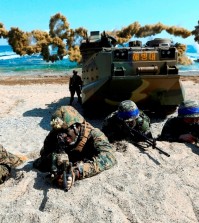
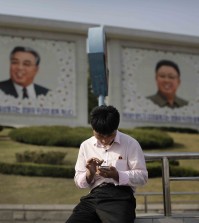

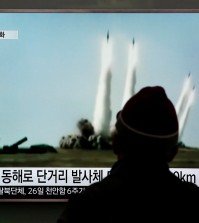



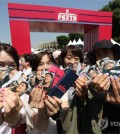

Pingback: Tourism is new cash cow for North Korea bringing in almost $45 million last year | On Reddit
Pingback: Cash Cow Small Business Ideas | How to start a Franchise
Pingback: Driving From Seoul To Pyongyang | dry - defensive driving